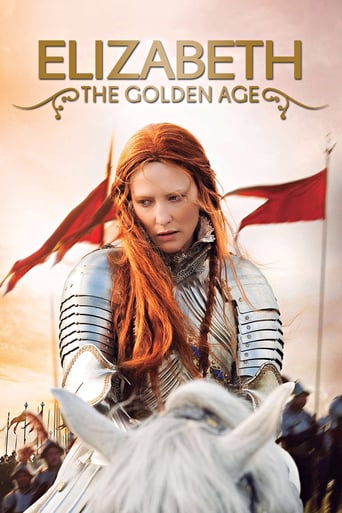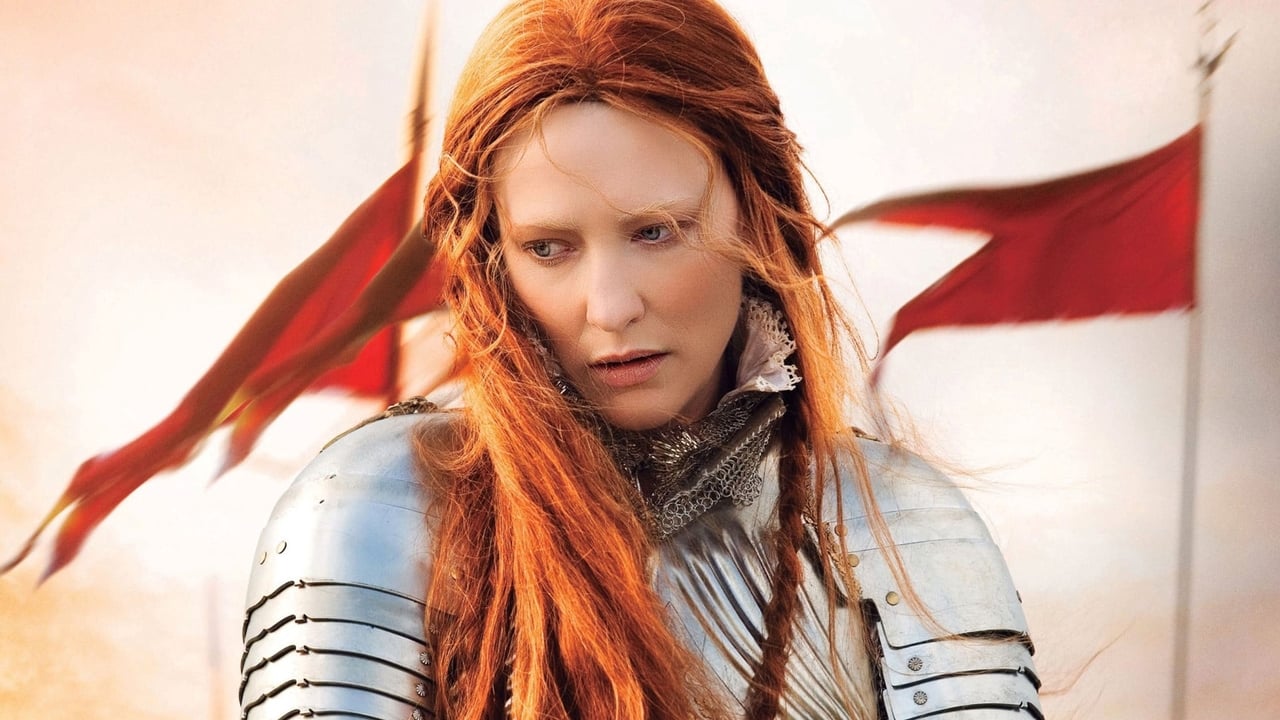ElMaruecan82
In my review of the 1998 "Elizabeth", I said that it was more than your average costume drama since it had more to offer than the
well, costumes to begin with, and the usual antechamber plots, dizzying castle shots and climactic outbursts of blood. It wasn't the most original comment but I'm even more partial to it after watching the sequel of nine years later.Shekhar Kapur's first film was about the rise to power and the tactically efficient ascension of a courageous woman who stood tall against the Catholic establishment at a time it was still having a wide influence over British citizens. She defeated the odds by becoming the second Protestant sovereign of Britain, a captivating conquest from a heroine who, by cinematic standards, was an 'underdog'. Her climactic purge was a Machiavellian masterstroke often compared to the Baptism Massacre of "The Godfather", not the most unflattering comparison.In "The Golden Age", we meet Elizabeth again and she's not an underdog anymore, if she was Rocky, it would be the third: she's the Queen, as majestic and imperial as ever, but a bit too comfortable and accessible given her regal aura. I didn't mind it at the beginning and thought it fit the film's subtitle. But at the end, I wasn't sure I would give it the same compliment than the first film. It is entertaining and there's not a single bad performance, but there's a spice lacking somewhere. Like instead of dealing with the 'uneasy the head where lies the crown' trope, the focus was located this time a bit lower than the head, and maybe, just like Balboa, Elizabeth got too "civilized" for her own good.The Queen is in a zone of comfort indeed, smiling, laughing, throwing a few winks to Bess, her first lady-in-waiting (played by the distractingly beautiful Abbie Cornich), making naughty jokes about her virgin status despite the zealous and formal insistence of Walsingham (Geoffrey Rush) to get her a husband. These parts tie the first act together and the sunny scenery, not to mention the magnificent art settings, make the whole thing a real visual delight. The problem is that these frivolous trivialities, rather than being the quietness before the storm are in fact the machinery structuring the whole first act, which makes the entrance of Sir Walter Raleigh (Clive Owen), supposedly one of the film's highlights, more problematic.Let me explain this: Owen is an extraordinarily charismatic actor, a man's man with a real presence, so instead of seeing in Raleigh the explorer who conquered a land he named Virginia in the name of you-know-who, who brought to England new resources such as potatoes, tobacco and gold, "borrowed" from Spanish ships
and not under their contentment, we see the dashing and dark brooding adventurer who immediately catches the eye of Cate Blanchett. We see the romance instead of the history, Elizabeth's heart-troubles contextualize the movie rather than the real problem 'out there', which is the rivalry with the most powerful Catholic country of the world: Spain. I wouldn't have minded an intimate angle
if it wasn't so superficial, not to mention, historically inaccurate.There's even a moment where the bond is so tight between Raleigh and Elizabeth that he crosses the line of insolence without even coming close to reach Elizabeth's breaking point. This Elizabeth is so hypnotized by the achievement of Raleigh that she forgot about her greatest conquest: power, and belittled herself in a way I didn't quite expect. I guess these artistic licenses were too blatant not to be deliberate, a sort of narrative choice meant to create a bigger contrast between Elizabeth's sudden vulnerability and the dark and scheming confidence of Philip II (Jordi Molla), ominously contemplating the conquest of England. The Spanish king is convinced that he's on the right side of God's Law while Elizabeth is the prey of doubt and love-sickness.It's not an uninteresting parallel between emotional fragility and unshakable faith, but the portrayal of Catholics isn't subtle and tends to reinforce that awkward feeling of something Manichean going on. I don't mind the Spanish being the antagonists, from a historical standpoint, it was true but it's all in the treatment and 'Golden Age" is too busy trading the authenticity for a few romantic subplots that I found myself lost more than once. The film shows an Elizabeth who's contested from within and from the exterior, whose loyal Bess gets pregnant from Raleigh but even the less literate in History knows that the real deal is the big fight against the Armada and couldn't care more about Elizabeth's self-esteem and existential issues.Yet the screenplay didn't establish solid hierarchies between the subplots. Everything is handled as if it was the same matter of life and death, to the point that we never really identify the moment where she Elizabeth overcame her demons, which basically means the whole second act. We have to accept that 'what didn't kill her made her stronger' to get ready for the big finale. It is ironic that in all this castle soap-opera, the most interesting character's arc is Marie Stuart (Samantha Morton) whose story-line is handled in better clarity and concludes in perhaps the most beautiful and memorable scene.I was baffled to read that the film took liberties with history, while it had the perfect material: the Spanish Enterprise, the assassination attempts, the execution of Marie and of course the Armada
whose climactic fight was too spectacular to elevate the film above conventionality, not that I believe Kapur tried to be unconventional. He was too busy making this visual ride that he forgot to stay focused on the few elements that made Elizabeth such an unconventional heroine.It's like Kapur was so carried away by the loss to "Shakespeare in Love" that he wanted his 'romantic' Best Picture contender. The film was "only" nominated for Best Actress and Costumes, not such a good idea, after all.
eric262003
"Elizabeth: The Golden Age" tells the tale of veteran ruler Elizabeth I (Cate Blanchett) at the fear of being overthrown by the powerful King of Spain Philip II (Jordi Molla) as he's on a crusade to declare full Catholic dominance in Europe in hopes that his young daughter becomes the new Queen of England. Meanwhile the scheming Mary Queen of the Scots (Samantha Morton) has plans of her own to dethrone Elizabeth by throwing her into her prison. When Sir Walter Raleigh (Clive Owen) returns from England after spending years in the New World, Elizabeth becomes enthralled by his presence as well as her lady in waiting Bess (Abbie Cornish). Chief Adviser Sir Francis Walsingham (Geoffrey Rush) continues to negotiate with the court affairs as he listens in on Mary's evil plots. Mary's demise was the perfect foil for Philip to release the infamous Spanish Armada in hopes to overthrow Elizabeth as the Queen of England. "I know I have the body of a weak and feeble woman; but I have the heart and stomach of a king, and of a king of England too; and think foul scorn that ... Spain, or any prince of Europe should dare to invade the borders of my realm; to which rather than any dishonour shall grow by me, I myself will take up arms, I myself will be your general, judge, and reward of every one of your virtues in the field." This was the words of encouragement Her Majesty as she gathers her troops in Tilbury to take down the Spanish Armada in 1588. This "Golden Speech" is one of the most quotable words in British history that's up there with the many that was said by Shakespeare and Churchill and that neither Hollywood can ever botch or paraphrase those famous words. No matter how hard they try. In 1998, I had the chance to see 1998's "Elizabeth" directed by Shekhar Kapur and my reaction was that is was incredibly stunning, but I had some issues with the pacing and I didn't really like Joseph Fiennes. In spite of those shortcoming it had plenty of Academy Awards nominations and other accolades to its credits. Nine years after that, they made the much anticipated sequel which is emphasizing on Elizabeth I and her relationship with Raleigh and the Religion Wars with Spain. From my knowledge I read that the Spanish couldn't get through because the English bays were not overly deep enough and the usages of fire ships and were also problematic. Strange as it seems, but Britain has been spared many times thanks to the waters surrounding the little country. Even their biggest ships were overturned due to excess stacking and abysmal weather conditions. As for the film itself the costumes were quite gorgeous, but the historical inaccuracies were way overwhelming. Whether it's the fictionalized homicidal attempt by gunpoint, or the uses of historical locations, the undermining of Sir Walter Raleigh and the condemning of the Roman Catholic Church, the misconceptions in the motives of Mary Stuart and the Spanish as a whole, the falsifying will likely scratch the heads of any historical fanatic. On the entertaining level, it is quite satisfying and will keep you on the edge of your seat, but the Spanish Armada is overwrought with a tedious montage sequence proceeded by an unorthodox shot of Elizabeth standing in a hallway. The entertainment value is pretty good and should leave a positive impression to the open public (not as good the first installment), however is there another reason why we should see another retelling of Elizabeth's life? I mean she's making more screen appearances than Abe Lincoln who seems to be in everything. One of the things that underwhelmed me about this movie was the lack of a grandeur epic moment. This sequel should've been flooded with highlights to usurp the predecessor, but with the exception of the Armada, this film was watered down badly. I guess the scene that caught my eyes was the one involving Philip II of Spain. Not because of the green hue or his personality as a cowering religious radical, but the peculiar ways the shots were handled. Which also includes the rather obscene dance scenes ever shot on film. Acting wise the supporting cast seemed underdeveloped, but Blanchett shows her true dominance as a leading performer. Even though this movie was very flawed, historically inaccurate and not overpowering in its delivery, this sequel is still strongly entertaining to watch if you like costume dramas, but if you want historical accuracy, it would better if you just read about in textbook.
aleugene
If your looking for a history lesson, you'd do better with Toy Story. This fluff-piece is a joke compared to its predecessor which has as much historical value as a wooden nickel. Apparently, according to this film, Elizabeth Tudor whined and whimpered and yelled all her queenly life in over-lit hallways that suggest that the halogen lamp was invented in the 16th century. Not a shadow to be seen on these movie sets. This time around, Elizabeth mopes and screams and whines like a jilted fifteen year old. Her maid in waiting, Bess Throckmorton, apparently missed all her acting classes because she could do nothing more than stare and vaguely smile. Clive Owen, who shows no more acting ability beyond that of a disembodied foot, looks like a cheap cartoon version of Errol Flynn in tights as he bandies around on ship ropes. He obviously texted in his role, sounding almost as dull and talentless as Liam Neeson doing Shakespeare. Even Bette Davis' version with Errol Flynn and Olivia De Havilland, another fluff piece, had the smarts to portray Elizabeth as a real queen, acerbic, angry, confused, intimidating to her suitors, but ultimately capable of running a powerful country, taking up more space than her underlings. Here, Cate Blanchett, whines and sobs like she had just failed her SATS and does nothing more important than wear clothes. Some scenes are so ridiculous, you'd thing you were watching a back story of the making of Project Runway. Cate Blanchett, in this version, seemed more interested in the buffet for the cast members than acting like she ruled one of the most powerful forces in European history. The only interesting piece centers on the revisionist version of Mary, Queen of Scots. Unfortunately, like half the film, her demise is filmed entirely in slow motion, making her drawn-out execution last longer than her actual life. This film would have cost half the time to watch if they hadn't filmed so much of it in slo-mo. Snore. This is the crib notes to history, lazily made for coasting high-schoolers, most of whom cheat on tests and are no more interested in actual history than the wigs on their head and their designer's dresses. Which brings us to the trumped-up reason for Elizabeth's white makeup and hair pieces. In this film, the writers want to give the impression that Elizabeth's most important decision was to become a born-again virgin. In reality, she suffered from eczema, lice and rickets. Her appearance and hair faux paus were more an excuse to cover up those maladies, not a goth need to look wacky to her subjects. While the previous film suffers from revisionism and loose attention to history books, it has beauty and depth this film lampoons. At worst, the first film avoids looking like it's brightly filmed on the set of "Friends." And, strangely, in a story about an historical figure whose beauty, or loss of it, Cate Blanchett is not only very attractive but the only character that doesn't age. My advice: stop reading magazines about body consciousness, get the heck off your pointless cell phones, stop watching "Stupid Vapid Housewives from Any County, and read a book on this amazing woman in English history. She took up a lot more space than this waste of celluloid implies.
Ruben Malayan (RubenMalayan)
I must admit, I am a sucker for historical films. But this one just confirmed what I see time and time again in the modern cinema - you may have all the money in the world, incredible cast, unbelievable production level and breath-taking art, but if your story and script are weak and the director lacks vision and pace - it will be a failure. This movie is a perfect example of that. The characters are very underdeveloped, the only one which is actually impressive is that of the King of Spain. Editing lacks pace, there is no climax and most of the time I wondered where all this is going? Ridley Scott should have directed this film and he'd make a masterpiece.



 AD
AD






